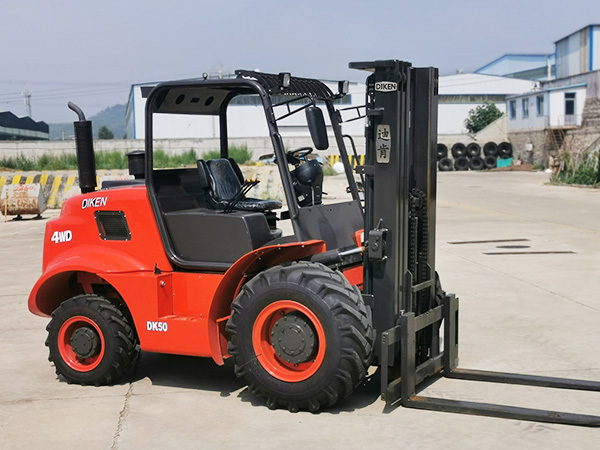Diken news
Maximizing Productivity with Off-Road Forklifts: A Comprehensive Guide
Release time: 2025-08-09
Maximizing Productivity with Off-Road Forklifts: A Comprehensive Guide
Table of Contents
- Introduction to Off-Road Forklifts
- Benefits of Using Off-Road Forklifts in Various Industries
- Common Applications of Off-Road Forklifts
- Choosing the Right Off-Road Forklift for Your Needs
- Maintenance Tips for Optimal Performance
- Best Practices for Operating Off-Road Forklifts
- Safety Considerations When Using Off-Road Forklifts
- Technological Advancements in Off-Road Forklifts
- Conclusion
- FAQs about Off-Road Forklifts
Introduction to Off-Road Forklifts
Off-road forklifts are specially designed vehicles optimized for uneven and rugged terrains. Unlike standard forklifts, off-road variants boast enhanced durability, larger tires, and superior traction to navigate rough landscapes. These forklifts are vital for industries such as construction, agriculture, and outdoor warehousing, where traditional forklifts may struggle to operate effectively. By investing in off-road forklifts, businesses can significantly **maximize productivity**, streamline operations, and enhance material handling processes.
Benefits of Using Off-Road Forklifts in Various Industries
Off-road forklifts provide numerous benefits that can positively impact productivity across various sectors. Here are some key advantages:
Enhanced Maneuverability
Off-road forklifts are equipped with larger, rugged tires that allow them to traverse uneven surfaces easily. This capability ensures that materials can be transported efficiently, even in challenging conditions.
Increased Load Capacity
Many off-road forklifts are designed to handle heavier loads compared to their on-road counterparts. This increased load capacity means fewer trips are required to move materials, ultimately saving time and improving productivity.
All-Weather Capability
Rugged forklifts are built to withstand adverse weather conditions, making them suitable for outdoor operations in rain, snow, or mud. This resilience ensures that work can continue uninterrupted regardless of the weather.
Versatility Across Industries
From construction sites to forestry, the versatility of off-road forklifts allows them to be employed in a myriad of applications. Their ability to adapt to different tasks makes them indispensable in many industries.
Common Applications of Off-Road Forklifts
Understanding the various applications of off-road forklifts can help businesses make informed decisions about their material handling needs.
Construction Sites
In construction, off-road forklifts are essential for moving heavy materials like steel beams, concrete blocks, and pallets of supplies across uneven terrain. Their ability to operate on soft ground enhances site efficiency.
Agricultural Use
Farmers utilize off-road forklifts for transporting crops, feed, and equipment across fields. Their robust design enables them to navigate through muddy fields and rough farming landscapes with ease.
Waste Management
In waste management facilities, off-road forklifts efficiently manage heavy loads of waste materials. They are crucial for sorting and transporting waste in outdoor processing environments.
Landscaping and Nursery Operations
In nurseries and landscaping businesses, off-road forklifts assist in moving plants, soil, and other materials. Their agility allows for effective maneuvering among trees and garden beds.
Choosing the Right Off-Road Forklift for Your Needs
Selecting the right off-road forklift requires careful consideration of several factors to ensure it meets your operational needs.
Assessing Load Capacity
Determine the maximum weight of materials you need to transport. Off-road forklifts come in various load capacities, and selecting one that can accommodate your requirements will enhance efficiency.
Evaluating Terrain Conditions
Analyze the types of terrain where the forklift will operate. Consider factors such as slope, soil type, and surface conditions to choose a model that performs best in those environments.
Size and Maneuverability
Evaluate the workspace dimensions, including height clearance and width constraints. Ensure that the forklift can maneuver effectively without hindering operations or risking safety.
Fuel Type and Efficiency
Off-road forklifts come in diesel, electric, and LPG fuel types. Assess the availability of fuel sources, operational costs, and environmental concerns when making your choice.
Maintenance Tips for Optimal Performance
Regular maintenance is crucial for ensuring your off-road forklift operates at peak performance. Here are essential maintenance tips:
Daily Inspections
Conduct daily inspections to check for any visible damage, fluid leaks, or wear and tear on tires and components. Early detection can prevent costly repairs and downtime.
Fluid Levels and Filters
Regularly check and maintain fluid levels, including engine oil, transmission fluid, and coolant. Replace filters as recommended to ensure optimal engine performance and longevity.
Tire Maintenance
Inspect tire pressure and tread regularly. Replace worn tires promptly to maintain traction and safety when operating on uneven surfaces.
Battery Care
For electric models, monitor battery health and charging cycles. Keep connections clean and ensure terminals are securely fastened to prevent power loss.
Scheduled Professional Servicing
Invest in regular professional servicing to address complex mechanical issues. Schedule maintenance according to the manufacturer’s guidelines to keep your forklift in top shape.
Best Practices for Operating Off-Road Forklifts
To ensure safe and efficient operation of off-road forklifts, follow these best practices:
Proper Training
Ensure all operators are adequately trained in operating off-road forklifts. Training should include safety practices, equipment handling, and emergency procedures.
Load Distribution
Always follow proper load distribution guidelines. Ensure that the load is balanced and within the forklift's rated capacity to enhance stability and reduce the risk of accidents.
Clear Communication
Implement clear communication protocols among team members when operating forklifts in busy environments. Use hand signals or two-way radios to maintain safety and coordination.
Slow and Steady
Encourage operators to drive cautiously, particularly on uneven terrain. Sudden movements or high speeds can lead to tipping or loss of load control.
Safety Considerations When Using Off-Road Forklifts
Safety should always be a top priority. Consider the following safety measures when operating off-road forklifts:
Personal Protective Equipment (PPE)
All operators and personnel in the vicinity should wear appropriate PPE, including hard hats, gloves, and high-visibility clothing to minimize injury risk.
Awareness of Surroundings
Operators should remain vigilant and aware of their surroundings, including pedestrians and other vehicles. Maintaining a clear line of sight is crucial for safe operation.
Emergency Procedures
Establish and communicate emergency procedures should an accident occur. Operators should be trained to handle emergencies effectively, ensuring swift responses to potential hazards.
Technological Advancements in Off-Road Forklifts
The landscape of off-road forklifts continues to evolve with technological advancements that enhance productivity and safety.
Telematics and Fleet Management
Telematics systems allow operators to monitor forklift performance in real-time. This technology can optimize fuel consumption, track maintenance schedules, and enhance overall fleet management.
Advanced Safety Features
Modern off-road forklifts come equipped with advanced safety features, such as stability control systems, rearview cameras, and collision detection sensors that help prevent accidents and injuries.
Electric Options
The introduction of electric off-road forklifts provides a cleaner alternative to traditional models. These forklifts offer lower operational costs and reduced environmental impact while maintaining robust performance.
Conclusion
Off-road forklifts are indispensable tools for enhancing productivity in challenging environments. By understanding their benefits, applications, and operational best practices, businesses can significantly improve their material handling processes. Selecting the right forklift tailored to your specific needs, combined with regular maintenance and adherence to safety protocols, will pave the way for efficient and safe operations across various industries.
FAQs about Off-Road Forklifts
1. What are the primary advantages of off-road forklifts compared to standard forklifts?
Off-road forklifts offer enhanced stability, increased load capacity, and the ability to navigate rugged terrains, making them suitable for various outdoor applications.
2. How often should off-road forklifts be serviced?
Regular maintenance should be conducted per the manufacturer’s guidelines, typically every 250 hours of operation or as specified in the owner’s manual.
3. Are off-road forklifts safe to operate on uneven ground?
Yes, off-road forklifts are specifically designed for uneven ground, featuring larger tires and improved weight distribution to enhance stability and safety.
4. Can off-road forklifts be used indoors?
While they can be used indoors, it is recommended to assess the suitability based on space constraints and surface conditions. Electric models are often preferred for indoor use due to lower emissions.
5. What factors should I consider when renting an off-road forklift?
Consider the load capacity, terrain compatibility, fuel type, and rental duration when choosing an off-road forklift to ensure it meets your operational requirements.
Keywords: off road forklift









